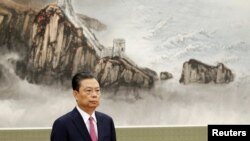Chinese President Xi Jinping on Wednesday tapped a low-profile official to lead his signature war on corruption, replacing the retiring Wang Qishan, whose sweeping anti-graft campaign had made him China’s second most-powerful politician.
Zhao Leji was appointed to the new seven-member Politburo Standing Committee and will take up Wang’s role as head of the Central Commission for Discipline Inspection (CCDI) from his position as head of the Communist Party’s powerful Organization Department, which is in charge of personnel.
Zhao’s appointment is likely to spur efforts to turn the fight against graft from a campaign into a structured feature of China’s political system, analysts said.
Xi’s corruption fight has ensnared more than 1.3 million officials, and he said during the twice-a-decade party congress that wrapped up this week that the battle to take down both “tigers” and “flies” will continue, a reference to elite officials and ordinary bureaucrats.
“Zhao’s job appears to be less about taking down tigers and swatting flies but more about effectively institutionalizing the anti-corruption system and getting the CCDI mechanisms implemented at all levels,” said Damien Ma, associate director at the Paulson Institute, a U.S. think tank.
“It’s going to be challenging, but he does have everyone’s files as former head of the Organisation Department.”
Speaking to reporters after unveiling his seven-member Politburo Standing Committee, Xi said that the party’s battle to rid itself of corruption, written into its constitution on Tuesday, is a “journey without an end”.
“There cannot be any virus in the party structure,” he said.
Wang, sometimes called the Communist Party’s “fireman” for his skill in resolving crises, has widely been credited with the success and vigor of the graft fight, which has been highly popular with the public while rattling the party elite.
Wang, who was previously vice governor of the central bank and helped oversee China’s recovery from the 2008 global financial crisis, built the once toothless and obscure CCDI into a feared watchdog that felled party heavyweights, including the former domestic security chief, Zhou Yongkang.
The campaign has also taken down many of Xi’s rivals and helped to tighten his grip on power.
Zhao, at 60 the youngest member of the Standing Committee, has been steadily promoted through his career, which has included long stints in poor rural areas, giving him a comparatively low profile among Chinese leaders.
Xi and Zhao have a “Shaanxi connection”, according to Cheng Li, a U.S.-based expert on Chinese politics at the Brookings Institution. They are among a group of politicians with personal and political ties to northwest China’s Shaanxi province, Xi’s ancestral home, who have moved up the party ranks in recent years.
Zhao spent much of his early career in the Shaanxi countryside, leaving him with a strong regional accent.
Institutionalizing anti-corruption
Xi plans to overhaul China’s anti-corruption architecture to create a powerful super-ministry, the National Supervision Commission, that will combine work by a number agencies, not including the CCDI, although the two will share offices and personnel.
The commission will also have the power to investigate civil servants, even if they are not party members, and will be backed by law, giving legal authority to many of the measures currently used by the party to investigate officials.
Xi also said last week that a secret party interrogation system, known as “shuanggui”, would be replaced with new detention measures, although rights groups say that it is unclear whether suspects will have access to lawyers under the new system.
Some experts have questioned how much power the new body will have without Wang at the helm. It is not clear who will head the new commission or exactly what its relationship will be with the CCDI.





